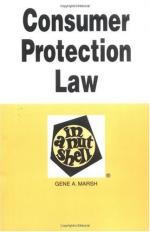|
This section contains 663 words (approx. 3 pages at 300 words per page) |

|
Webster's dictionary defines consumerism as "a movement for the protection of the consumer against defective products, misleading advertising, etc." Limited consumer protection was present until the 1950s and early 1960s. In the 1950s, a significant breakthrough occurred with the establishment of the product-liability concept, whereby a plaintiff did not have to prove negligence but only had to prove that a defective product caused an injury. In his 1962 speech to Congress, President John F. Kennedy outlined four basic consumer rights, which later became known as the Consumer Bill of Rights. Later, in 1985, the United Nations endorsed Kennedy's Consumer Bill of Rights and expanded it to cover eight consumer rights. Consumer protection can only survive in highly industrialized countries because of the resources needed to finance consumer interests.
Kennedy's Consumer Bill of Rights included the right to be informed, the right to safety, the...
|
This section contains 663 words (approx. 3 pages at 300 words per page) |

|


